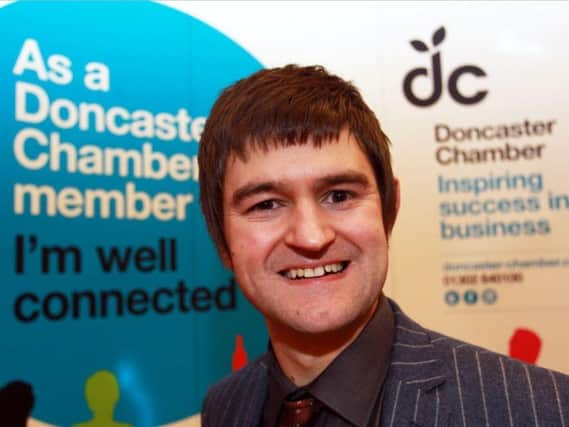Chamber CEO's anger over Government's '˜shoddy treatment' of Doncaster's business community


Dan Fell, the chief executive of Doncaster Chamber, claimed the Government was sending out the message that it was not interested in listening to businesses outside the big cities, after the Northern Powerhouse Minister Andrew Percy pulled out of a major corporate event at short notice.
In a speech to the Doncaster Business Conference, Mr Fell said he had also been frustrated by the “deafening periods of silence” from the Government about Doncaster’s plans to create a University Technical College (UTC) to help bridge the skills gap.
Advertisement
Hide AdAdvertisement
Hide AdMr Fell added: “Regrettably, our frustrations with national Government have only been exacerbated this week, by the unfortunate news that the Northern Powerhouse Minister, Andrew Percy MP, has dropped out of today’s event with little notice and little explanation for why he does not want to engage with the Doncaster business community.
“This, coupled with the challenges we have encountered with the UTC project, sends the regrettable message that Government is not interested in listening to businesses beyond those in the UK’s core cities.
“For me, it also betrays an alarming amount of complacency about how concepts such as the Northern Powerhouse and Industrial Strategy might be brought to life on the ground.”
In his speech, which was delivered to an audience of 220 business leaders at Doncaster’s Legacy Centre, Mr Fell described how Doncaster Chamber was one of the biggest supporters of plans to bring the UTC to Doncaster.
Advertisement
Hide AdAdvertisement
Hide AdHe said that local manufacturing, construction and rail engineering firms were telling the chamber “on pretty much a daily basis” that they had problems with the talent pipeline for their industries.
“This is why the chamber, along with Wabtec Rail and Keepmoat Construction, became a founding member of the UTC and why we have worked doggedly for the last two years to convince Government that this institution is a necessary addition to Doncaster’s education landscape. The journey has been hard.”
He said many people in the room would be well versed in the frustrations the UTC’s supporters have encountered.
He added: “Put simply, this shoddy treatment of the business community is not good enough, and flies in the face of the Government’s own rhetoric about technical education and social mobility.”
Advertisement
Hide AdAdvertisement
Hide AdAlthough the “tide is slowly turning” and a dialogue has been opened up with Government, Mr Fell said the UTC will not hit its initial opening date of September 2018.
He added: “Furthermore, this week’s news about the General Election now makes me nervous of promising you that we will deliver the UTC in September 2019 instead.
“However, I can promise you that your chamber is not giving up on this one, and that we will work resolutely with our partners until industry and young people in Doncaster have the quality of technical education available to them that they deserve.”
A spokesman for the Government said that Mr Percy was unable to attend the conference due to “diary issues”.
Advertisement
Hide AdAdvertisement
Hide AdThe spokesman said that the Government had engaged with the businesses in Doncaster on many occasions, and it remained very committed to the Doncaster business community and the Northern Powerhouse.
The conference also featured speeches from Dr Adam Marshall, the director general of the British Chambers of Commerce, Sir Gary Verity, the chief executive of Welcome to Yorkshire, and a panel discussion featuring Caroline Flint, Labour MP for Don Valley, and Greg Wright, the deputy business editor of The Yorkshire Post.
Many communities around the country are seeking guidance on the potential for further devolution deals, according to Dr Marshall.
Speaking after delivering his speech at the Doncaster Business Conference, Dr Marshall said: “There are lots of business communities around England who still want to know whether decisions are going to be made closer to home than they are at present.”
He said many firms around the UK are spending time in local schools and colleges, making sure that pupils are ready for work.